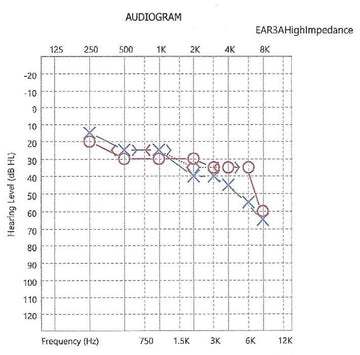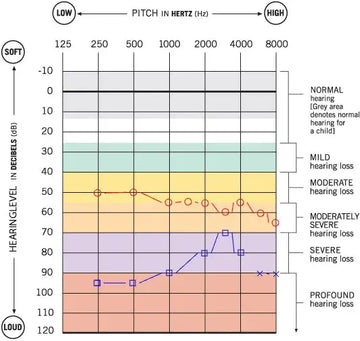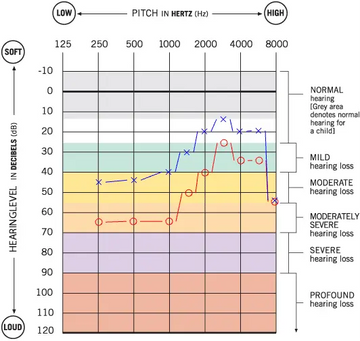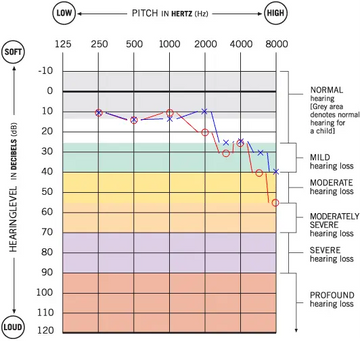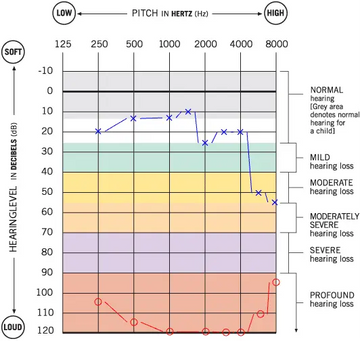Abstract
Ms. Limas*, a 73-year-old woman, experienced a sudden onset of bilateral normal sloping to severe sensorineural hearing following the death of her mother. This period of grief led her to high stress, anxiety, and depression, which she believed contributed to her hearing decline and constant tinnitus. Initially fitted with Phonak Audeo P90-R hearing aids, she found them uncomfortable and ineffective. In late 2021, she was fitted with Oticon More 2 R miniRITE hearing aids, which she expressed improved her hearing.
A follow-up hearing test in 2022 showed a slight decline, exacerbating her concerns. However, by the Spring of 2024, after months of therapy and reduced stress levels, her hearing tests revealed slight improvements. This case highlights the complex relationship between mental health and auditory function, suggesting that effective stress management could positively impact hearing outcomes. Regular hearing tests, appropriate hearing aid fittings, and addressing mental health are crucial for managing sensorineural hearing loss, especially under significant life stressors.
Introduction
Definition of Stress-related Hearing Loss
Stress-related hearing loss is a condition where high levels of stress, anxiety, and depression can negatively impact hearing. Stress can affect the body in many ways, including reducing blood flow to the inner ear, which can damage the delicate hair cells responsible for hearing (Schmitt et al., 2000). This type of hearing loss is becoming more recognized as we understand the broader impacts of mental health on physical health (Gomaa et al., 2014; Canlon & Hasson, 2013).
Incidence and Prevalence of Hearing Loss
Over 466 million people around the world, representing more than 6.1% of the world's population, suffer from disabling hearing loss. More than 40 million individuals in the United States experience this condition, which accounts for 4.6% of the population. Among those aged 12 and above, around two million people have severe-to-profound hearing loss in both ears, making hearing loss the country's third most common chronic health issue (Zeitler et al., 2024).
Hearing loss is particularly prevalent among older adults, with about one in three individuals aged 65 and older experiencing some degree of hearing impairment. This prevalence rises with age, as nearly half of individuals over 75 face significant hearing difficulties (Zeitler et al., 2024; Jiang et al., 2023).
Chronic stress, however, can worsen conditions like tinnitus, which affects around 15% to 20% of the U.S. population. Understanding the connection between stress and hearing loss is crucial for effectively managing mental and auditory health (Jayakody et al., 2018).
Ms. Limas’ Case History:
Ms. Limas arrived at the clinic in the late Fall of 2021 with concerns about hearing and tinnitus, as well as dissatisfaction with using her Phonak hearing devices. In early 2021, Ms. Limas initially visited her primary ENT physician, who diagnosed her with bilateral normal to sloping moderately-severe sensorineural hearing loss. However, her word discrimination ability score was excellent (100% at 60dB HL bilaterally).
v 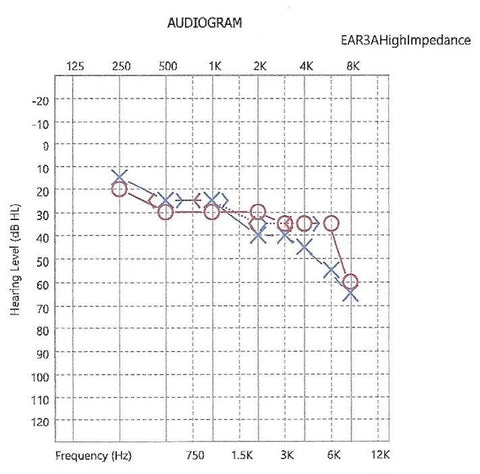
Ms. Lima’s Early 2021 (Initial) Audiogram
Along with her hearing loss, Ms. Limas also developed constant tinnitus and auditory hallucinations in which she described hearing music in her head. Ms. Limas reported that her primary care physician suggested that her hearing loss, tinnitus, and auditory hallucinations may have been stress-reduced. Ms. Limas expressed that she had lost her mother three months before reaching out to her physician for concerns about sudden onset hearing loss and tinnitus.
Ms. Limas was also fitted with Phonak Audeo P-70 R rechargeable receiver in the canal (RIC) hearing aids by her initial hearing aid specialist at another facility. She expressed dissatisfaction with the Phonak hearing aids. She indicated that her Phonak devices were not user-friendly, as she had extreme difficulty placing the devices on her ears. She also expressed difficulty understanding speech with the use of the devices. She expressed she hardly wears them. Ms. Limas stated she could not return them due to an expired trial period and poor customer service. It was strongly suggested to re-counsel her on the use of the Phonak hearing aids and to re-program them to her updated hearing test. She declined the recommendations and indicated that she would like to try a different set of hearing aids instead to determine if she could get better speech quality and comfort.
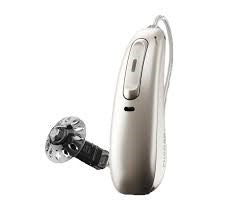
Ms. Lima’s Phonak Audeo P-70 R RIC hearing aid
A hearing test was completed for Ms. Limas to determine if there was a change in her hearing sensitivity compared to her initial test results. Her test results revealed normal sloping to moderately-severe sensorineural hearing loss in the right ear and normal to sloping severe sensorineural hearing loss in the left ear. There was a slight decrease in her left hearing sensitivity compared to her early 2021 test results. Her word discrimination ability score was excellent (100 % at 65 dB HL for the right ear and 96% at the volume level of 60 dB HL for the left ear).
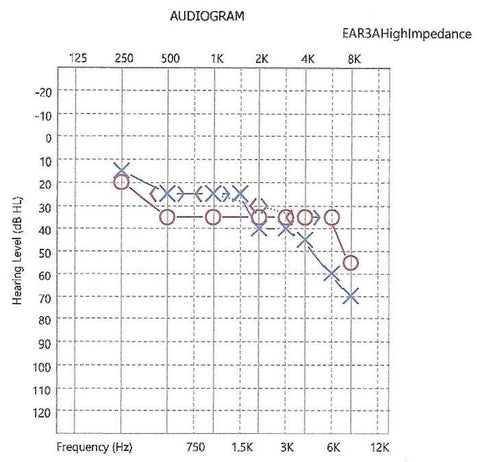
Ms. Limas’ Late 2021 Audiogram
After a lengthy hearing aid evaluation, Ms. Limas was interested in trying Oticon More 2 R rechargeable mini Receiver In The Ear (miniRITE) hearing aids. She immediately noticed an improvement in her hearing capabilities with the new devices.
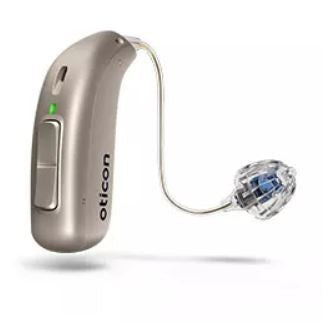
Ms. LImas’ Oticon More 2 R miniRITE hearing aids
Progress and Continued Challenges
In the Winter of 2022, a little over a year later, Ms. Limas completed an annual hearing test. Her test revealed normal to moderate sensorineural hearing loss in the right ear and normal to severe sensorineural hearing loss in the left ear, with excellent word discrimination ability (100% at 65dB HL). However, there was a noticeable slight decrease in the left hearing sensitivity, especially in the high frequencies, compared to her late 2021 test results.
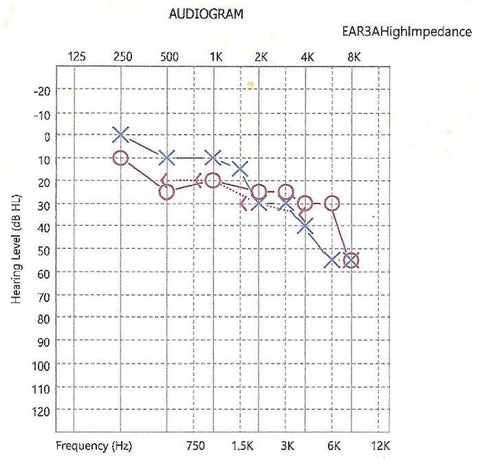
Ms. Limas’ 2022 Audiogram
Ms. Limas expressed that she continued to experience tinnitus and auditory hallucinations due to high levels of stress, depression, and anxiety as she was still grieving the loss of her mother. She reported that she has decided to take therapy sessions, attend a place of worship, and stay in touch with her primary care physician. She indicated she needed a complete mental evaluation for anxiety and depression and to determine the need for medication. She indicated she was not wearing her Oticon hearing aids often at home as she lived alone.
It was counseled that Ms. Limas wears her hearing aids during her waking hours to help her brain learn to process auditory information and follow up with her primary care physician. She agreed and expressed that she would do better by wearing her hearing aids as long as possible during her waking hours and taking breaks as needed.
Therapeutic Interventions and Impact
In the Spring of 2024, Ms. Limas arrived at the office for her updated hearing test, as it has been more than a year and a few months since her last visit. When she arrived, she appeared healthy and happy to be at the clinic. She reported that she no longer experienced auditory hallucinations, and her tinnitus was not as noticeable. She also expressed that she noticed her left hearing aid was slightly loud as she had to constantly reduce the overall volume of her hearing aids for better comfort.
Ms. Limas expressed that she has been seeing her family therapist, maintaining her visit with her primary care physician, taking her prescribed medication for depression and anxiety, and taking much-needed recommended self-care to help reduce her stress and anxiety levels. She indicated that she now has a positive outlook on life thanks to attending her place of worship and growing faith.
Her updated hearing test was conducted to determine the change in her hearing sensitivity. Remarkably, the results indicated normal to moderate bilateral hearing loss with some improvements in her hearing compared to the previous test. Her word discrimination ability was excellent bilaterally (100% at 55dB HL).

Ms. LImas’ 2024 Audiogram
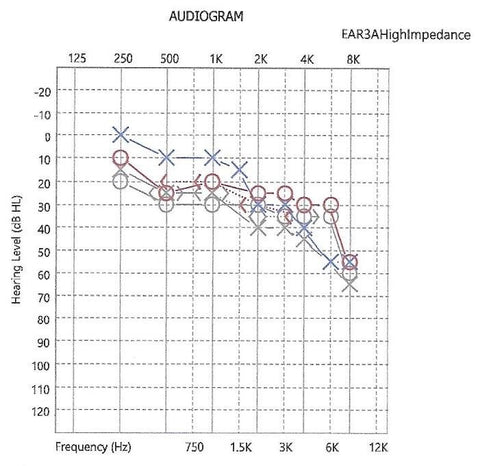
Ms. LIma’s Audiogram Comparison (Gray= Early 2021; Color Red and Blue= 2024)
Ms. Limas’ Positive Changes
Ms. Limas attributed this positive change to several factors:
1. Therapy and Counseling:
Ms. Limas had been seeing a therapist prior to the test, which she believed significantly reduced her stress, anxiety, and depression.
2. Prescribed Medication:
She reported that medication prescribed for her mental health conditions helped her function better in daily life.
3. Faith and Stress Reduction:
Ms. Limas mentioned that her growing faith was crucial in reducing her stress levels.
Ms. Lima’s Hearing Aid Adjustments
As a result of these interventions, she found that sounds became slightly louder and sometimes uncomfortable, causing the need to make minor adjustments in her hearing aids' volume. Her hearing aids were re-programmed to hear updated hearing tests for better listening and speech comfort. Her hearing aids were verified using the real-ear-measurement verification tool (Verifit), which determined that her hearing aids were meeting targets for soft, medium, and loudness levels.
Analysis and Interpretation
The case of Ms. Limas suggests a complex interplay between mental health and auditory function. High stress levels can affect blood circulation in the inner ear, exacerbating hearing loss and tinnitus. Conversely, reduced stress levels contributed to a temporary improvement in her hearing. This could be due to several factors:
1. Enhanced Focus and Attention:
With reduced stress, Ms. Limas might have been better able to focus during hearing tests, leading to more accurate results.
2. Improved Blood Circulation:
Lower stress levels improve blood flow to the inner ear, allowing some recovery of auditory function.
3. Therapeutic Effects on Tinnitus:
Effective management of stress and anxiety can reduce the perception of tinnitus, improving overall hearing satisfaction.
Conclusion
Ms. Limas' case underscores the importance of holistic treatment approaches in managing hearing loss, particularly when associated with significant life stressors. Regular hearing tests, appropriate fitting of hearing aids, and addressing underlying mental health issues can collectively improve hearing outcomes. Ms. Limas plans to continue her regular check-ups and adjustments to her hearing aids, acknowledging the crucial role of reduced stress in her auditory health.
Audiologist’s Takeaway
Increased stress can negatively impact hearing by affecting inner ear blood circulation and exacerbating tinnitus. Conversely, reducing stress through therapy, medication, and other interventions may temporarily regenerate some hearing cells and improve hearing test outcomes for Ms. Limas. Therefore, it is essential to consider mental health as a significant factor in managing sensorineural hearing loss.
2025/01/05 Update
It is important to understand your actual hearing situation, take a hearing test at LINNER website now for free and within 5 mins.
References:
- Schmitt, C., Patak, M., & Kröner-Herwig, B. (2000). Stress and the onset of sudden hearing loss. International Tinnitus Journal, 6(1), 41-49. https://www.researchgate.net/profile/Birgit-Kroener-Herwig/publication/8946601_Stress_and_the_onset_of_sudden_hearing_loss/links/561ba50608ae78721fa0f2b5/Stress-and-the-onset-of-sudden-hearing-loss.pdf
- Gomaa, M. A. M., Elmagd, M. H. A., Elbadry, M. M., & Kader, R. M. A. (2014). Depression, Anxiety and Stress Scale in patients with tinnitus and hearing loss. European Archives of Oto-Rhino-Laryngology, 271, 2177-2184.
- Canlon, B., Theorell, T., & Hasson, D. (2013). Associations between stress and hearing problems in humans. Hearing Research, 295, 9-15.
- Jayakody, D. M., Almeida, O. P., Speelman, C. P., Bennett, R. J., Moyle, T. C., Yiannos, J. M., & Friedland, P. L. (2018). Association between speech and high-frequency hearing loss and depression, anxiety, and stress in older adults. Maturitas, 110, 86-91.
- Jiang, C. Y., Han, K., Yang, F., Yin, S. Y., Zhang, L., Liang, B. Y., ... & Han, Y. X. (2023). Global, regional, and national prevalence of hearing loss from 1990 to 2019: A trend and health inequality analyses based on the Global Burden of Disease Study 2019. Ageing Research Reviews, 102124. https://www.sciencedirect.com/science/article/pii/S1568163723002830
- Zeitler, D. M., Pinkston, J. B., & Holcomb, M. A. (2024). Hearing loss in older adults. Geriatrics & Gerontology International, 24(2), 233-241. https://doi.org/10.1111/ggi.12345
- Shukla, A., Harper, M., Pedersen, E., Goman, A., Suen, J. J., Price, C., Applebaum, J., Hoyer, M., & Lin, F. R. (2020). Hearing loss, loneliness, and social isolation: A systematic review. Otolaryngology–Head and Neck Surgery, 162(5), 622-633. https://doi.org/10.1177/0194599820910377
***Please Note: To safeguard the individual's privacy, the name has been changed in this article.
***Disclaimer: The content presented here serves general informational purposes and is not intended as professional advice or a replacement for medical consultation. It is essential to seek personalized guidance and assistance from a qualified physician or hearing healthcare provider for any specific questions, concerns, or individual health conditions related to hearing. A professional in the field can offer a comprehensive evaluation and suitable recommendations based on your unique circumstances. Ignoring or postponing seeking medical or professional help may have negative impacts on your health. Always consult with a healthcare professional for precise diagnosis, appropriate treatment, and personalized advice concerning your hearing health.***

